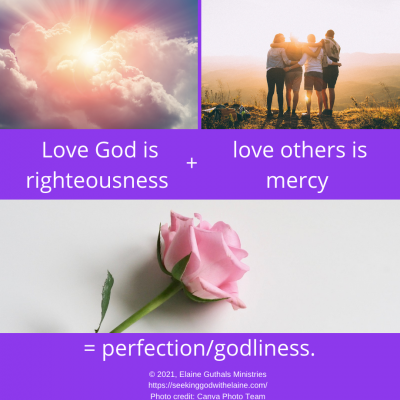The greatest commandments tell us what we need to do to gain eternal life — love. This daily devotional looks at the questions asked and the responses given.
Nuggets
- Questions may appear to be designed to show our genuine love of God, but we aren’t always honest with Him or ourselves.
- Jesus wants us to verbalize where we are at in our faith.
- Loving God and others lead to eternal life.
- We can have the right answer, but not answer the question correctly.
- We can’t justify our sin to or deflect it from God.
Devotions in the Putting the Great Commandments into Practice series

One of the bad things about doing devotions on the Sunday Morning Bible Study passages is we have looked at lots of them before. For example, we had a whole devotion on the Greatest Commandments and another on the Good Samaritan.
But a great thing about doing devotions on the Sunday Morning Bible Study passages is we get to look at them in a different way. Here, we previously didn’t look at everything together. Now we get a chance to do that. Plus, we can pull in nuggets from other times we mentioned them.
The problem is that it won’t fit into one devotion. So, we are going to look at them back-to-back.
Let’s Put It into Context #1
In previous devotions, we said that Christian perfection is achieved when we follow the two greatest commandments. We also tied them to churchy words.

- Righteousness is the result of a solid relationship with God built by a sincere life of conscientious obedience to God’s laws and commandments.
- God’s mercy is the unexpected way God responds in love to our needs. Disciples’ mercy is a characteristic of compassion for the needs of others, especially those who are in distress.
- Godliness, equated with the Old Testament term fear of the Lord, is reverence in thought, feeling, and conduct that is promoted by walking in His Spirit and obeying God’s laws and commandments and produces a moral likeness of God.
Let’s Put It into Context #2
Jesus hooked two passages together to form the basis of His greatest commandments.
- “Love the LORD your God with all your heart, with all your soul, and with all your strength” (Deut. 6: 5 CSB).
- “Do not take revenge or bear a grudge against members of your community, but love your neighbor as yourself; I am the LORD” (Lev. 19: 18 CSB).
Verse Commentary
The Question Is Asked
“Then an expert in the law stood up to test him, saying, ‘Teacher, what must I do to inherit eternal life?’” (Lk. 10: 25 CSB)
Questions may appear to be designed to show our genuine love of God, but we aren’t always honest with Him or ourselves.
Some may say we really shouldn’t bite on the lawyer too much. Don’t we frequently do what he did?
Just bottom line it for us. We don’t want to read how you got there or what it really means.
We only have about two minutes at the screaming outside to devote to God, so do cliff notes. Don’t expand.
What we really want is a checklist. Isn’t that what we want from the laws Moses gave to the Israelites? That way we have firm evidence that we are doing what we are supposed to be doing.
But look how Elmslie talked about it. He discussed external ramifications of the lawyer’s question.
Resource
Ooo, baby. Think about that to mean we just want the superficial external results. We don’t want the cost of eternal life being heart level.
We would think — on the surface — this question should be very appropriate. We should want to know what we need to do to spend eternity with God.
It keeps running through my mind that we said in a previous devotion (which, of course, I can’t find) that this lawyer may have been a scribe. They were the experts in the law. Parker said this would have been an educated man of good standing.
Resource
But scribes and Pharisees were on a totally different page from a totally different book than Jesus. They wanted their ceremony and fulfillment of the do’s and don’ts to earn them eternal life.
Luke said that the lawyer was trying to tempt Jesus. (In my most sarcastic voice ever) “Oh, no. Not a lawyer/scribe/compatriot of a Pharisee. They never had it out for Jesus.” Wink*wink
But look at it this way. If the lawyers then were anything like they are today, asking questions is the name of their game. They are trying to get information out of the person they are cross-examining.
Not only that, but the lawyers are trying to trip the person up so that they can further their position. In other words, they are trying to win the war of words.
This one seems to be trying to help his own cause.
We Have to Evaluate the Law Ourselves
“‘What is written in the law?’ he asked him. ‘How do you read it?’” (Lk. 10: 26 CSB)
Jesus wants us to verbalize where we are at in our faith.
We can see the lawyer trying to further his cause in tempting Jesus. But Jesus flipped it. He immediately asked him a question.
In a way, Jesus was trying to start where the man was. Elmslie wrote, “He must bring out the man’s own notions, and then, when He has got them, it may be possible to show him how threadbare, how poverty-stricken, how wrong they are.”
Resource
Then Jesus dug in a little deeper. “How do you interpret it?”
We each have our own understanding of what the law says. It can say something different to us based on our values and our experiences.
What we have to keep in mind is that we have interpretations. Jesus has fact.
Eternal Life Is Based on Perfection
“He answered, ‘Love the Lord your God with all your heart, with all your soul, with all your strength, and with all your mind,’ and ‘your neighbor as yourself’” (Lk. 10: 27 CSB)
Loving God and others lead to eternal life.
Did you catch what this answer is? It is the Shema. This is what Moses gave the Israelites in his goodbye speech.
Remember, Love God Is Righteousness + Love Others Is Mercy = Perfection/Godliness
This tells us that we need to totally submit to God. He is looking for our whole being to be focused on Him.
Oh, hold the phones! You mean they had the answer to the question for years and years and years???????
Jesus had cautioned them to “don’t misunderstand why I have come. I did not come to abolish the law of Moses or the writings of the prophets. No, I came to accomplish their purpose” (Mt. 5: 17 NLT).
Oh, back up! The lawyer knew the answer before he asked the question!
Faith has a foundation, in part, of the law. The law tells us what sin is. It also tells us that we can’t save ourselves. The law leads us to Jesus as our Savior.
Burner expanded that. He reminds us that we put our faith into practice through the law.
Resource
Let’s break down what loving God and others means.
- We love God by showing that we want to please Him.
- We love God by enjoying being in His presence.
- The and and must makes all the list required actions.
- We need to love God with our nature, thoughts, reasoning, arguments, and power.
- Loving our neighbor talks more of morals than affection.
- Loving others should have the same emphasis as loving God — and loving God should have the same emphasis as loving others.
- Carpenter contended that “… the power to love man always grows in proportion to the love that you have to give.”
Resource
Does Obedience Lead to Eternal Life?
“‘You’ve answered correctly,’ he told him. ‘Do this and you will live’” (Lk. 10: 28 CSB)
We can have the right answer, but not answer the question correctly.
If we would have been Jesus, we would have said, “Right in part. Way wrong in another part. It has to get to heart level.”
I don’t think we would have been able to leave it as, “That is correct, so go do it.”
Maybe we can look at it this way. The lawyer had the knowledge but not the wisdom. He had the rote memorization but not the enlightened acceptance of God’s principles that leads to knowledge, discernment, and good sense that is put into practice through salvation, increasing our goodness and virtue.
When Jesus told the lawyer, “do this,” he was basically telling him that there is only one action you can do to gain eternal life. It is ABCDing.
The ABCDs of Salvation
If you have not become a believer in Christ, please read through the
Plan of Salvation and prayerfully consider what God is asking you to do.
A – admit our sins
B – believe His Son Jesus is our Redeemer
C – confess God as Sovereign Lord
D – demonstrate that commitment by making any changes needed in our lives to
live the way in which God has called us
The Disciple’s Job Description
Jesus was not telling him that he could earn salvation. There would be no way for him to gain it by merit.
The lawyer had to come into God’s presence through love and a belief that Jesus was the Messiah. We have to do it God’s way.
Elmslie brought up a very good point. Never once in this passage did Jesus mention the word obey. That is where the lawyer was heading. “I do this, and You acknowledge my reward now.”
Resource
Emmons begged to differ. He thought it was obvious where the obedience came in: “… Do this and you will live’” (Lk. 10: 28 CSB). We are to obey what God has required of us.
Resource
What is required, according to Jesus, is love. His way. Not the religious way or the worldview way. Not the way that supports the lawyer’s views. God’s way.
We have big flashing lights around the do this. Eternal life comes from loving God that shows itself in loving others. We can’t skip a step and think we’ll get eternal life.
We have to read the law through the lens of a redo for godliness. It has to change us to be more like God.
The Correct Answer, But
“But wanting to justify himself, he asked Jesus, ‘And who is my neighbor?’” (Lk. 10: 29 CSB)
We can’t justify our sin to or deflect it from God.
The lawyer must have gotten the difference. He immediately “… [wanted] to justify himself …” (Lk. 10: 29 CSB). It sounds like he started squirming.
Flint contended that part of the reason the lawyer was squirming was that he, in his heart, really didn’t feel he could be saved in God’s way. Since he thought loving God was hopeless, his question focused on loving others.
Resource
But was the lawyer looking for the letter of the law and not the spirit of the law? We have to remember there would have been so many people the lawyer would have written off as not being his neighbor. That makes the parable that much more impactful.
Parker contended that we should always know who are neighbors are in our hearts. If the lawyer thought Jesus was going to give him a, “good job!” – even though he didn’t know who his neighbor was was, he needed to think again.
We are not going to listen to Jesus if we are focused on our point of view. Remember, we have to deny ourselves.
To read a related devotion, click the button below.

Making the Connections
Thomson brought up a great point that intersects with our Redo for Godliness series. We’ve said that the definition for godliness had been equated with the Old Testament term fear of the Lord. Now it is considered reverence in thought, feeling, and conduct that is promoted by walking in His Spirit and obeying God’s laws and commandments and produces a moral likeness of God.
Resource
But in the Old Testament, fear could mean terror sometimes. They weren’t feeling the love. They felt the fright.
That didn’t mesh with the love in Deuteronomy and Leviticus. The lawyer probably had an attitude adjustment to perform.
Jesus made sure He answered the correct question. Parker reminded us that “God has never left the greatest questions of the human heart unanswered.”
Resource
We have to make sure we ask the right questions in the right way for the right reasons.
How Do We Apply This?
- We have to read Scriptures so that we can determine how we interpret it. God is going to start there with us, also. With us, however, if we don’t read His Word, we are not seeking Him. We can’t love Him with our whole being and not seek Him.
- God isn’t looking for us to be distracted. He wants our total commitment.
- “Love does no wrong to a neighbor. Love, therefore, is the fulfillment of the law” (Rom. 13: 10 CSB). We do not harm them in any way. We speak well of them.
- Honor God through faithfulness and obedience.
- Love in the right spirit.
- Grow love by performing the associated tasks.
- Imitate God’s love.
Resource
We have to put our emphasis on loving the way God does. In the next devotion we will talk about putting that into practice.
Father God. You are love. We want to be love. Teach us to love Your way so that we can share it with others. Amen.
What do you think?
Leave me a comment below (about this or anything else) or head over to my Facebook group for some interactive discussion.
If you don’t understand something and would like further clarification, please contact me.
If you have not signed up for the email daily or weekly providing the link to the devotions and the newsletter, do so below.
If God has used this devotion to speak with you, consider sharing it on social media.
Pingback: Practicing Love – Seeking God with Elaine
Pingback: Attributes of God: Omniscient and All-Knowing – Seeking God with Elaine
Pingback: Praying the Wrong Way – Seeking God with Elaine